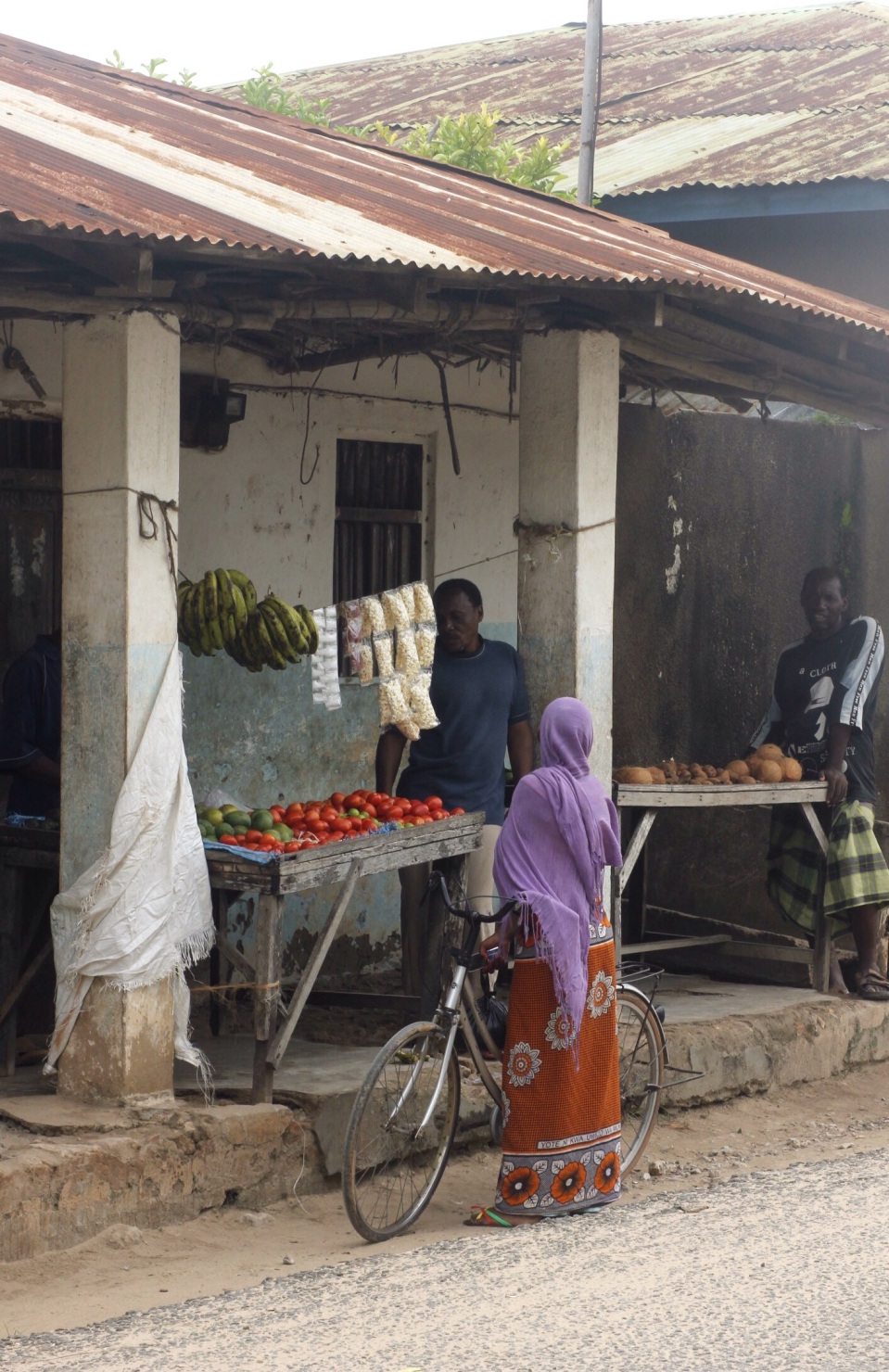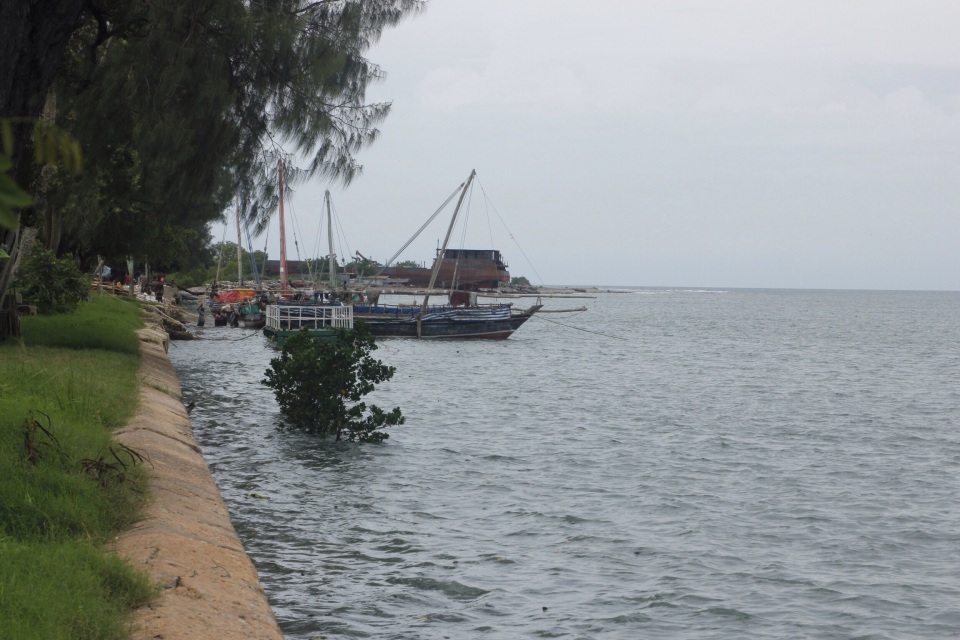Pangani, the Old Arabic Port Town
We woke up today to the sound of monkeys above our tented lodge. What is neat about staying in tented lodges in Africa is that you get to hear all the animals during the day and night. This really makes for a unique experience…
Mkoma Bay served us a beautiful breakfast buffet of fresh fruits, muesli, juices, chapati, eggs, and sausage. I am amazed at how lovely this place is (a well needed break in the middle of backpacking through a Eastern Africa.). We spent most of the morning walking along the beach, picking shells, and relaxing in hammocks near the seashore. We also spent numerous hours massaging our sore muscles from Kilimanjaro…
Around 12 we set off with Ulrich for Pangani, a nearby historical town. Panga means “to arrange” during the time of the slave trade between Eastern Africa and the Middle East. The name Pangani comes from the town’s history of slave trading. Pangani was a port town built at the end of the Pangani river that flows all the way from Kilimanjaro and as a result slaves were able to be shipped from inland Tanzania to the coast of the Indian Ocean where they were auctioned off and shipped to Oman and Saudi Arabia. Pangani was first settled by Arabs, then the Portuguese, and finally the Germans. Due to the presence of so many different nations, there is much Arabic, Indian, and colonial influence in many of the buildings, ships, foods, and traditions.
Everyday ships come in to port from Zanzibar where they bring products from all throughout the Middle East. I love seeing the Arabic writing on on the grocery and hygiene products… It makes me feel like I am in an old Persian movie or something. Zanzibar is a beautiful island off the coast of Tanzania where the Arabs created a trading post during the time of the spice trade. Zanzibar served as the trading point between India and the Middle East. Zanzibar wasn’t originally on our travel plans but after hearing many of our fellow travelers talk about the beautiful stone town and the spice tours they took, we may have to check it out while we are in Dar Es Salaam.
We woke up today with the intentions of getting ourselves as close to Dar Es Salaam as possible. We ate delicious fruit, yogurt, muesli, and breads for breakfast and then proceeded to gather our belongings from our tented safari lodge and check-out. Ulrich was kind enough to take us into Pangani where we could catch a small local bus to the larger coastal city called Tanga.
Wow. That local bus was quite an adventure. Many buses in Africa have a departure time but they normally do not leave until every seat is full, and full has a very different meaning here. Let me explain the definition of full in Africa. Andrew an I boarded the 12 passenger van at 10:30 and we were lucky enough to be on our way just a few minutes after 11:00am. Normally buses like this will wait 2, maybe 3 hours before they depart. At the time of departure we have 17 people in our 12 passenger van and at the time of arrival in Tanga nearly 3 hours later, Andrew counted 28 people inside our 12 passenger van. We were lucky that we were by the window, that we had water, and that no passengers had decided to bring their chickens on board, which is a very common occurrence here in Africa. The bus ride was only supposed to take one hour, but due to the conditions of the roads that were destroyed by rain, and a driver who stopped every 10 minutes to make sure the bottom of the van wasn’t scrapping the ground, we arrived in just under three hours.
We heard there were some cool things to do in Tanga, such as tour a unique underground cave system, but we decided that we would first see if we could catch a bus onward to Te capital (Dar). We were told at Mkoma Bay to take Ratco Express and not any other bus company.
When we got out of our mini bus, as usual a dozen street hawkers swarmed is offering “terrific deals” on multiple destinations throughout the country. Many of the men were advertising for buses to Dar and were nearly fighting one another for or business. In situations like these I am very glad that I have Andrew who likes to stick to the plan. While I would have probably just taken one of their bus offers to Dar. Andrew navigated us to the Ratco Bus office where we quickly purchased a ticket and set off for the capital. The bus cost less than $5, had AC, was absolutely clean, and offered us free beverages and snacks… That does not typically happen in Africa.
We arrived in Dar Ea Salaam on time, just a few minutes after 8:00pm. The entire ride took less than six hours and the bus only made one stop at a rest station! Normally the buses stop for every person on the roadside who is looking for a lift.
Tom and Mariam, our two local friends who we met through church were already there waiting for us. They drove hours through heavy traffic just to meet us at the bus station. This evening was the first time we have ever met in person, and on the way back to their place they stopped by one of their favorite local eateries and bought us dinner. When we arrived at their house they gave us to a beautiful room with a private bathroom and offered to help us with anything we may need. Tom and Mariam are one of the kindest couples that I have ever met, and we are excited to spend the next few days with them!
(Below: Andrew’s post)
Waking up clean, while not a common occurrence, has been the best feeling in Africa. Both Kylie and I started the day with a shower before setting off for pangani, the closest city to mkomba bay. We had decided to do a city tour with a guy named Kassim who took us around and explained the significance of many of the historical sights in the area. Pangani had been. Major slave port while it was under the rule of the Arabians, who used the river as a way to get slaves from Tanzania to the major shipping ports before sending them off to Saudi Arabia. We had the chance to visit many of the old buildings where slaves were organized according to strength before being sold. Some of the things Kassim explained to us were quite grim, a reflection of the times. Even the name of the city ‘pangani’ comes from the root word ‘paga’ which means to organize or line up (the process the slaves went through before being sold). We finished the tour of the city around noon and Kylie and I ran some errands. Before catching two bodabodas back to mkomba bay.
Most of the day we spent chatting by the shores of the Indian Ocean. We organized our plans, took care of business in general, and rested both our bodies and our minds.
In the evening we were joined by Lisa, Ulric, and a new couple from Holland who are living in Burundi. Since the 4 of them are development people (community, social, etc) there was a lot of discussion about the situation in Africa. Since development isn’t exactly my forte, it was quite an experience to learn what people saw as perceived barriers to growth in Africa. A lot of it comes down to corruption and a lack of infrastructure. The roads themselves limit the transport of goods since they are so rough. Collecting water takes some people all day. Government officials pocket money instead of investing in education or people. The list goes on and on.
While I’m not sure which lever is the appropriate one to assist people in Africa, I’m sure the solution lies in a combination of things rather than just one issue. The question for me is how do you battle a multi-faceted problem without spreading yourself too thin.








